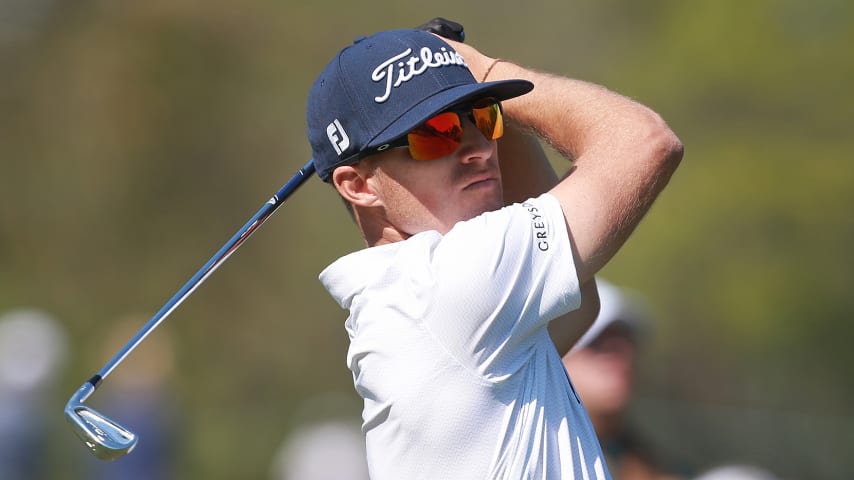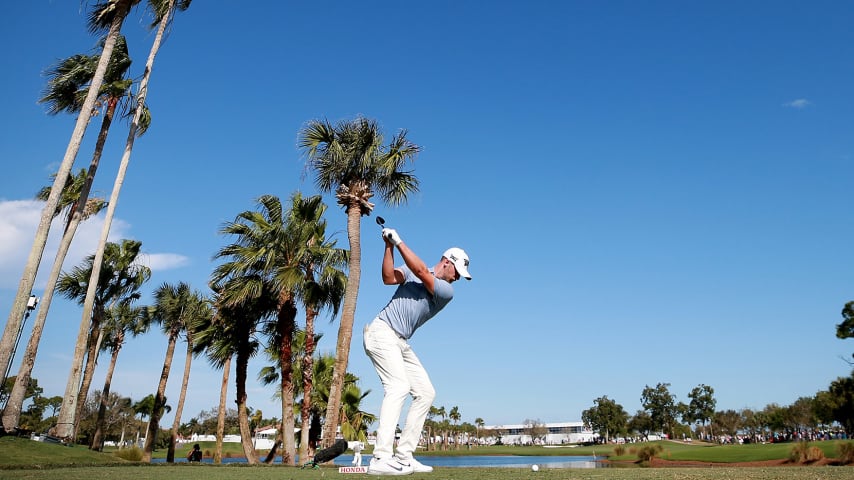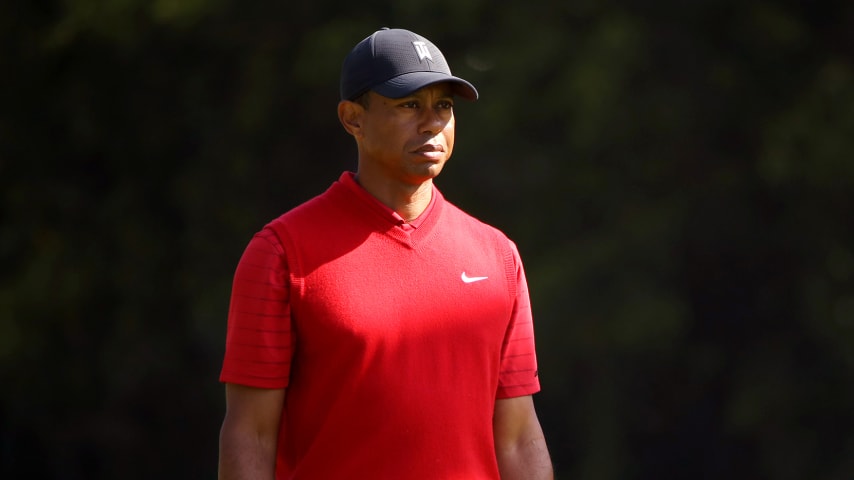Hoffmann beginning to write next chapter after Muscular Dystrophy diagnosis
11 Min Read

PALM HARBOR, FLORIDA - MARCH 21: Morgan Hoffmann watches his tee shot on the eighth hole during the first round of the Valspar Championship on the Copperhead course at Innisbrook Golf Resort on March 21, 2019 in Palm Harbor, Florida. (Photo by Matt Sullivan/Getty Images)
Written by Helen Ross
Chelsea Colvard and Morgan Hoffmann were on their first date, just getting to know each other, their words flowing back and forth with ease.
Among the many topics of conversation? Morgan told Chelsea that his right pectoral muscle had deteriorated, which is more than a little concerning for a man who makes his living swinging a golf club. His best guess at the time was that he’d damaged a nerve or injured himself working out.
Related: Hoffmann receives 2020 PGA TOUR Courage Award | No stopping Hoffmann in his fight against muscular dystrophy
“I just kind of wrote it off and I didn't think a lot about it,” Chelsea recalls. “But I did notice that as we got closer and closer (as a couple), he would start taking phone calls in front of me that were between him and different doctors.
“I started to kind of get the idea that I'm like, ‘OK, it seems like he's still trying to figure out what's going on with this whole missing pec thing.’”
Two years into their relationship, one of the more than two dozen doctors Morgan had consulted finally called him with a diagnosis. The 27-year-old had facioscapulohumeral muscular dystrophy (FSHD), that typically causes atrophy of the chest, back, neck, arms and sometimes, the legs.
There is no cure. No drugs that you can get at the pharmacy that will slow the progression of the disease, either.
That was the hardest thing for Chelsea to understand.
“It was pretty shocking at first just because of the fact that I hadn't ever been in a situation where someone got a diagnosis that wasn't immediately followed by some sort of a protocol to get better,” she says.
“It was just this very helpless feeling that you're like, ‘Okay, you have this diagnosis but now what? What can I do? What can we do to help?’ There just wasn't a lot of answers. It was an unsettling time.”
So, Morgan and Chelsea, who married in November of last year, immediately set about finding their own path to his health and well-being, relying on holistic treatments, herbal tinctures and a strict raw fruit- and plant-based diet to detoxify his body, as well as yoga and meditation and a hyperbaric chamber.
Morgan, who is currently on medical leave from the PGA TOUR, went public with his diagnosis in the fall of 2017, writing a first-person essay in “The Players Tribune.” The couple started a foundation that has raised more than $2 million in less than two years to help find a cure for the disease.
The ultimate plan is to build a health and wellness center that will be a “one-stop shop” for those battling debilitating muscular diseases, staffed by doctors, therapists, nutritionists and other specialists. The goal is to people fighting chronic diseases take control of their health.
On Monday, Hoffmann became the fourth recipient of the PGA TOUR Courage Award, joining Erik Compton (2013), Jarrod Lyle (2015) and Gene Sauers (2017). The award is presented to a player who, through courage and perseverance, has overcome adversity to make a meaningful contribution to the game.
“It was really a shock and something that is obviously very special with the past recipients and how much they have done and what they have been rewarded for,” Morgan says. “And to be a part of that is very humbling, but obviously it’s a situation that you don’t want to be in.
“But I’m accepting it with as much gratitude as I can and hopefully, I can really help our foundation and make a change in people’s lives.”
Chelsea met Morgan in March of 2015. She was working in real estate and living in Miami at the time and had gone to see some friends from Oklahoma, where she was born, who were visiting in Jupiter, Florida.
Turns out, they were staying at Morgan’s house and the friends were teammates of his at Oklahoma State. But he was in Miami playing in the World Golf Championships-Cadillac Championship at Doral.
The next day her friends asked Chelsea if she’d like to go to the golf tournament. It was her first time outside the ropes – but certainly would not be her last.
“I show up to Doral having no idea what the attire for a golf tournament would be,” Chelsea recalls. “I think I was wearing high heels and jeans -- just something completely inappropriate to walk a golf course in.
“I started following Morgan and I could see him joking with his caddie and I swear I think they were making fun of my attire.”
That night, the group – including Morgan – went out to dinner.
“I still remember that my mouth was so sore at the end of that night because I could not stop smiling,” she says. “It was just an instant connection with Morgan. I was smitten. That was it. After that we were pretty inseparable.”
Three years later, Morgan got down on one knee on a boat in the Bahamas and proposed, announcing the engagement on Jan. 2, 2019 in an Instagram post, saying it “took 2018 from being the worst, to the absolute best year of my life.” Chelsea thinks that dealing with his diagnosis helped draw the couple closer than either could have imagined.
“It definitely was hard but, hey, at the risk of sounding kind of cliché I really do feel like those hard times are huge character-building moments,” she explains. “For Morgan and I to go through that together even right before we ended up getting married it was kind of a situation where I felt like we had already been through so much and we really saw what we were capable of and how strong we could be.
“It just made me even more sure that I had a really great life partner to face anything with.”
Morgan says Chelsea “didn’t bat an eye,” when he told her about the diagnosis. And she has been there every step of the way, researching the disease, talking with doctors and naturalists, helping to identify potential treatments and even going through the same six-month raw fruit cleanse. He gives her every credit for the success of the foundation, as well.
“She's my rock -- just always there by my side and no matter what I want to do, how crazy it may seem she's supportive and not just supportive like, oh, I'm here for you rooting you on,” Morgan says.
“She's actually taken it to a different level of now she's studying Dr. Robert Morse and going through certification classes of regenerative detoxification and it's something that I never expected to have somebody do for me, but she's doing it with me as well.
“And it's really special to have my then girlfriend and now wife be that influential in my life and that we're kind of doing this together and creating this foundation and her ideas and her organization has been really helpful for me.”
Chelsea, for her part, has always admired Morgan’s strength and positive outlook on life. She admits to worrying, though, that his spirit might be broken after the diagnosis. Instead, she found herself feeding off his energy and any concerns she may have had now feel like a lifetime ago.
“All of his athletic activities brought him so much joy and they seemed like they were the most important part of his life, his flying, his golf,” she says. “You know, he doesn't just play golf. He loves all sports and all activities. He loves to surf. He loves to skateboard. Everything that requires your muscles.
“I got scared that I would kind of lose a piece of him for that diagnosis, that he would be sad in a way that I wouldn't be able to help, and I wouldn't be able to fix it and that maybe no one would be able to fix it and then what would we do?
“That went away. I think that fear lasted for about a year. As we've kind of evolved into this new lifestyle and as our journey has progressed it's brought both of us a lot of comfort in that area and I'm not really scared of any of those things anymore.”
A typical day at the Hoffmann house generally begins with Morgan rising first, then meditating for an hour of so on the back porch near the water garden. By the time he’s done, Chelsea is usually in the kitchen juicing whatever fruit they’re having that day and making a breakfast smoothie. It’s a far cry from the meat-and-dairy-based diet she existed on when she met her future husband.
“We only eat plants and we eat mostly fruit,” Chelsea says. “We do not eat very many cooked things. The one thing that we still eat that's cooked on a semi-frequent basis is sweet potatoes. It's nice whenever you are craving something warm, the sweet potato gets us by.
“(So, it’s) mostly fruit and mostly raw. The idea behind that is fruit has the highest level of electromagnetic energy, which is basically what all living things really are, what they boil down to at least, our smallest parts. We're just a big ball of energy.
“Not only does eating the fruit help to elevate your energy and you can feel it. You wake up and you have a big fruit smoothie and it's like ... You just feel alive. It's a great feeling.”
Yoga classes and reading right now fill most of the time that Morgan might have spent at the practice range. The couple devours books written by herbalists and naturopathic healers, looking for more ways to combat his disease. They watch inspiring documentaries on TV, as well.
Scribbles and Yama, their two dogs, need attention, too, and the couple often walks them on the beach. Paddle boarding is another favorite activity. In the evenings, Morgan spends time in a hyperbaric chamber that allows him to breathe nearly pure oxygen to boost his body’s healing capabilities.
Chelsea says she’s always be interested in natural healing practices, although she’s never applied them to her life like she has in the four years that she’s known Morgan. Her mother’s side of the family is Native American, and her grandmother made plant-based, herbal salves and tinctures.
“She would kind of share information with me that had been used by Native Americans since the dawn of time pretty much as we know it -- at least, human existence as we know it,” Chelsea says. “I thought that that was so cool that I'm like, ‘Wow. I can use a method of healing that's been used for some 30,000 years. That's incredible that that knowledge has been passed down through generations and generations.’
“It wasn't until I really started applying it to my life that I saw how incredibly powerful it really is.”
Chelsea says the lifestyle changes she and Morgan have made have helped her, as well. Her psoriasis has cleared up and the symptoms she used to suffer from a mild case of Tourette’s Syndrome are almost non-existent. Her family has adopted a similar lifestyle and her mother’s arthritis pain has subsided, too.
“It's constant motivation for both of us that as we get deeper and deeper in giving up all of these things,” Chelsea says. “We don't feel like we're giving things up as much as what we're gaining. You know?”
Morgan hasn’t played in a PGA TOUR event since the Shriners Hospitals for Children Open in October. He has three starts remaining on his major medical exemption and needs to earn 238.4 FedExCup points in order to retain his playing privileges.
Getting and staying healthy, though, is Morgan’s priority right now. He has so much more in his life than chasing a little white ball down a lush green fairway. He recently restored a 1961 Mach 1 Mustang. He is involved with a thriving performance clothing company called Greyson.
And of course, there is the Morgan Hoffmann Foundation, which will hold its third celebrity pro-am June 21-22 at Arcola Country Club, where he learned the game, in Paramus, New Jersey.
Hoffmann is just beginning to write the next chapter in his life. And Chelsea, for one, can’t wait to see what happens to them both.
“I think Morgan was looking for a lot of his joy in athletic accomplishments,” Chelsea says. “I don't even know where I was looking for mine. I think I was just really still trying to figure myself out and once we got this diagnosis, we set off on a journey that we thought would be just starting to try to understand all of the different alternative healing methods.
“What that ended up becoming was us understanding a certain type of lifestyle that we could embody that would put us in the best possible place every single day to be as happy as we can be, to be as healthy as we can be. It's become our biggest passion.
“It's become our spirituality. It's really become everything to both of us. It's given us a purpose.”












